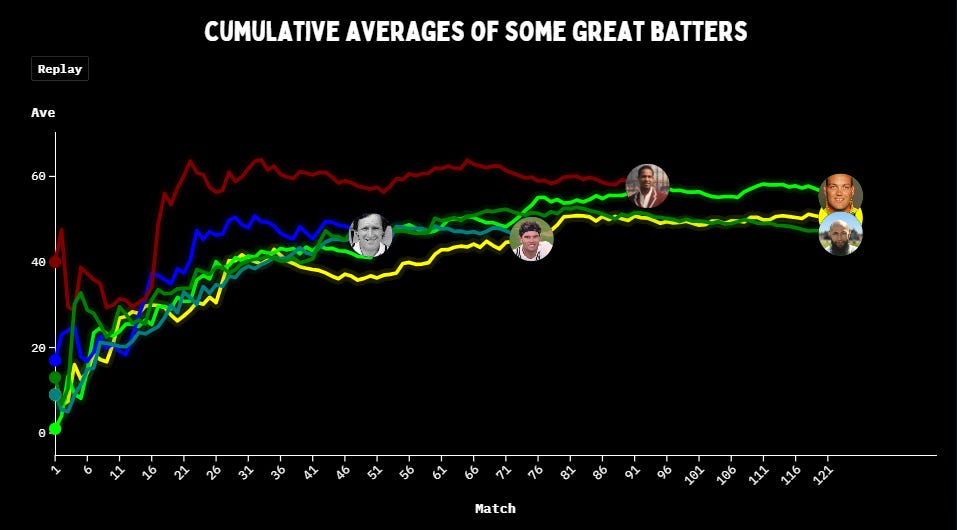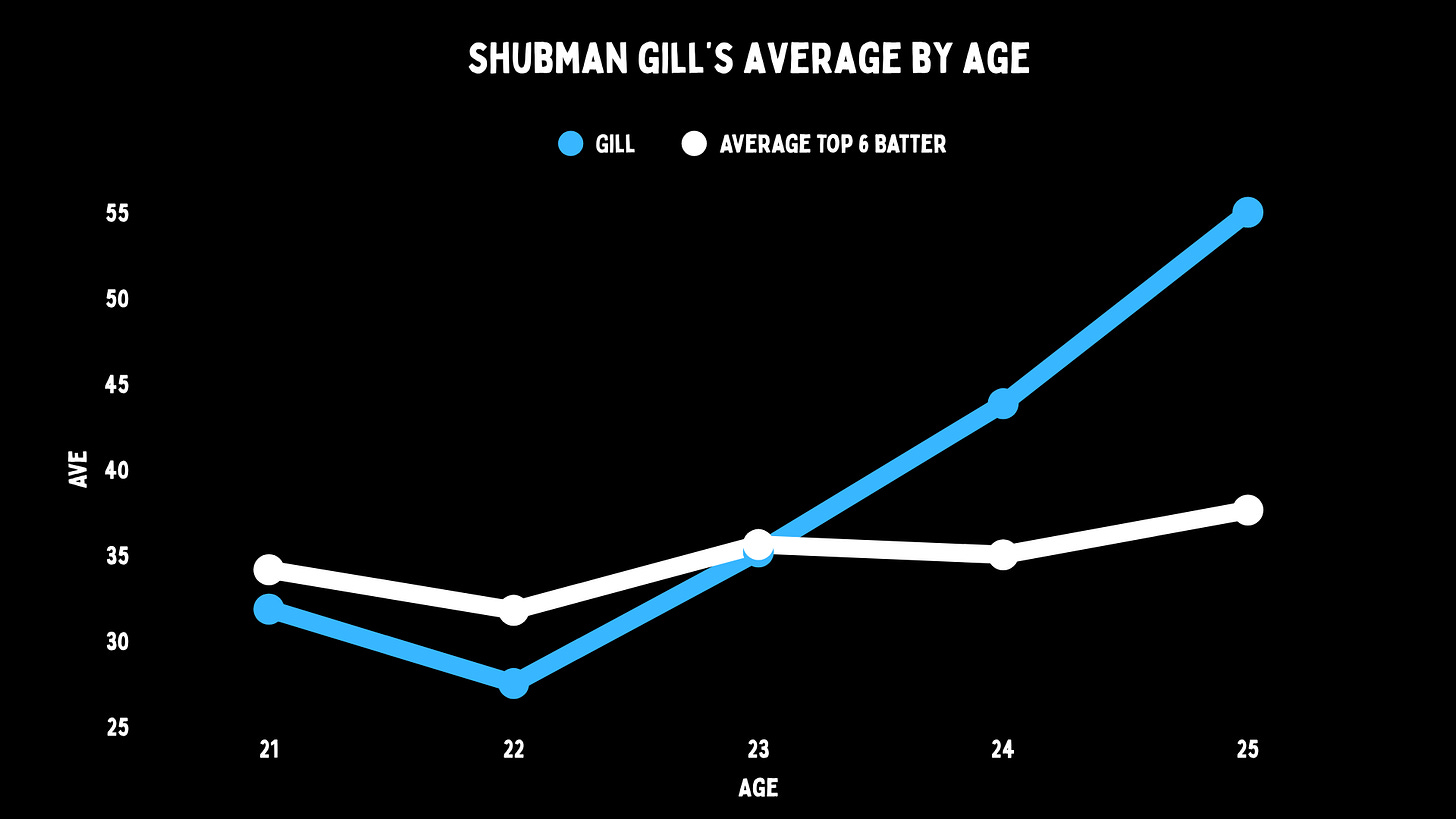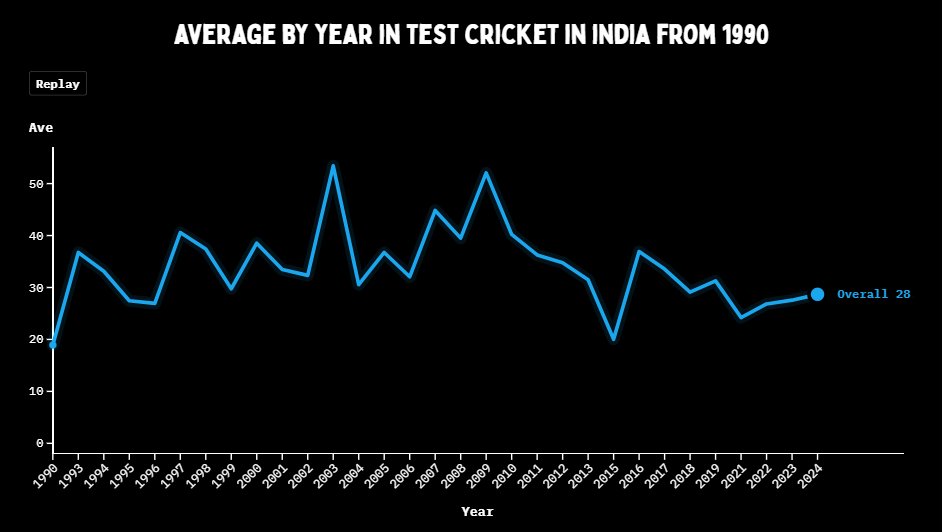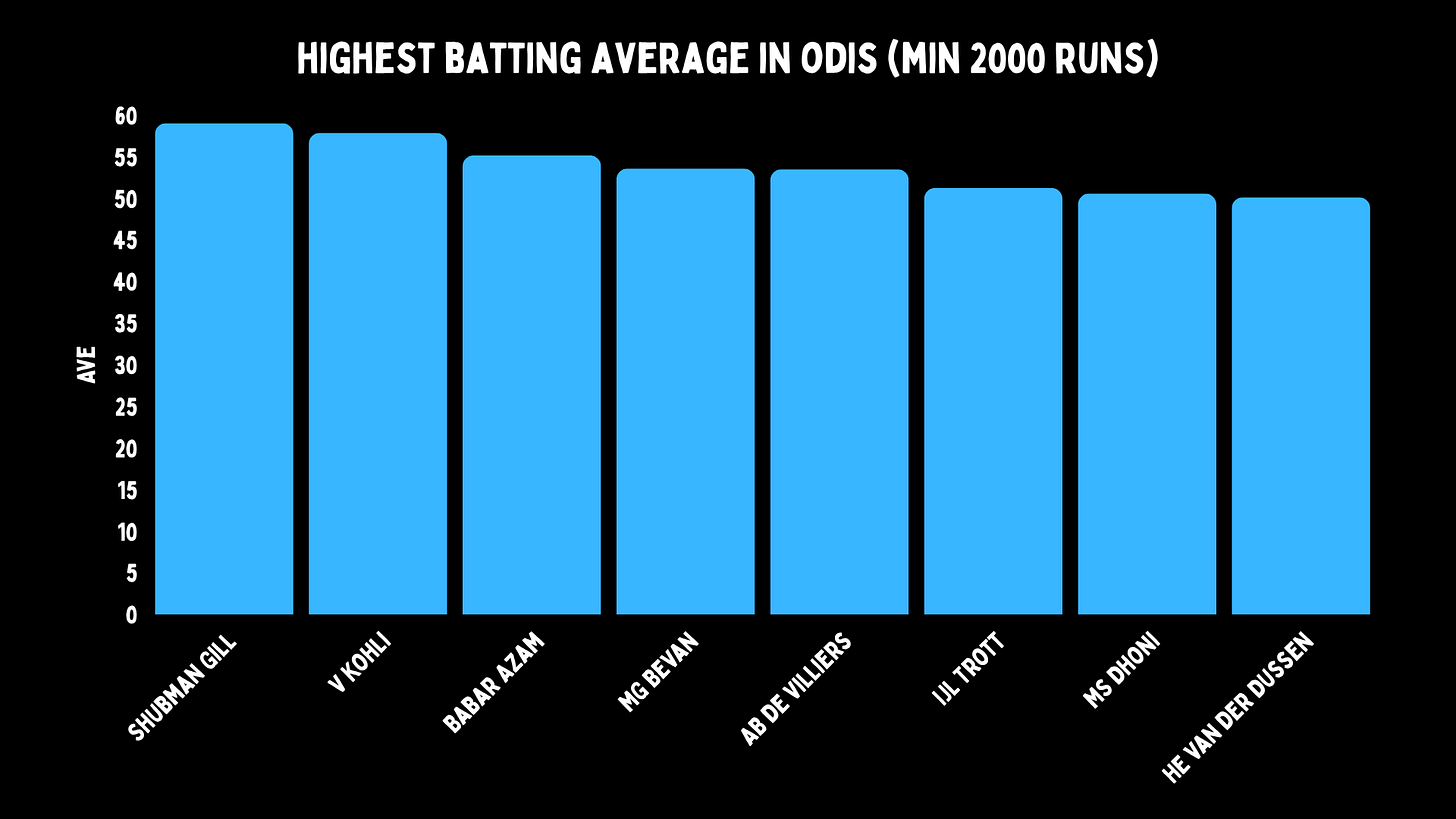Shubman Gill is no longer a baby
It takes a long time to grow a Test starter. There are many pitfalls along that journey.
UK readers can get their copy of the book here:
We have no patience. As a society, as a culture, as a cricket community. We want runs, and we want them now. Give them to us. Cover us in their liquid glory. Let us bathe in them.
So if you want to make us wait, we turn into giant angry babies.
Some batters don't come into Test cricket and star. They don't even come in and do well for quite a while. Most young players are not picked because they're ready, but because their ceiling is that of a ten-year player, or even a ‘once in a generation’ type of player. And that's the goal as a selector, right? To find the mythical player a team can be built around. You find a few of those and your job is done. The rest of it is dealing with injuries, form, and role players. Just throw that young player in the sea and if they float, they are what you have been always looking for.
But even great players sometimes sink early on. Garfield Sobers took an age to make any sort of consistent runs in Test cricket, Jacques Kallis and Steve Waugh were the same. And if you think about those three guys, all of them were brought in because they had some kind of all-round skill. So they were not kept around just because of their batting, but because they could also bowl.
There are others who were specialist batters. Dennis Amiss is a big reason that cricket has a helmet, and he wasn’t even averaging 20 after 12 Tests. He'd end up at 46. When I saw a young Hashim Amla, he was someone with no foot movement and he seemed almost permanently stuck to the crease. I thought there is no way this guy is ever going to make consistent runs in Test match cricket.
A few years later, I watched him make a triple century at the Oval. Graham Gooch was about as slow a starter as anyone has ever been, and really doesn't get great until his thirties. And the Kiwis throw in Martin Crowe well before he was ready.
It takes a long time to grow a Test starter. There are many pitfalls along that journey. It's not something where they just come ready out of the box. They need food, water, patience and a little bit of luck.
And on a completely unrelated note, Shubman Gill now averages more than 40 in Test match cricket. He's not a baby anymore.
India were 95 for two when Gill came out to bat. That may not sound like pressure, but for a team kind of trying to ensure that they were at least going to draw the game on a very flat wicket, this was not an ideal start.
It's hard to bat in Test cricket when you are new as well. I mean, a tall 12-year-old could drive a car, but chances are things would go wrong if we let all of them try. But because of the success stories of some young batters, we get very excited for new young cricketers who come in. But most batters generally peak around the age of 28. The average keeps going up in the 30s because of survivor bias, as only the best players last until their late 30s. But in their 20s, most players struggle to find their way.
When Shubman Gill was starting out, he basically averaged just below par for three years. He doesn't stand out as someone who was terribly bad, but neither was there enough to protect him from the cricket fans who were desperate for runs. But in the last two years, he's suddenly a lot better than when we'd expect from someone of his age.
It looks like a very early maturation, and it's one of the reasons he's been made captain so young. The other one is the lack of options, but it's quite clear that he has a level head on his shoulders, understands his own game and he was the right person available to be their leader.
But what didn't come at the right time were India's wickets in the final session of day one. They had already lost Jaiswal, and because of Gill's slow scoring rate, they didn't have as many runs on the board as they would have wanted. And at five wickets down on a flat wicket, there was a chance of another 400-ish total. And the problem is that England can score so quickly that those totals are often completely meaningless in the modern game. Test cricket has changed a lot.
Of course, Gill already knows lots about the modern game because he made his debut in 2020. And that was if not the eye of the storm, it was certainly close enough for a farm in Kansas to be dropped on your head. For a decade and a half, everyone made all the runs they could have ever wanted. And then the pace playing pandemic starts and it was hell on earth for batters. It is not a good time to be a 21-year-old in Test cricket, especially as this period was ruining much more set players who were in their peak.
The good news is, he could always rely on the sweet comforts of Mother India to heat up his cold streak at home. Or, he could also play in an era when India were trying to make their wickets spin sideways so no one could beat them at home. It meant that Gil made his debut when no one was making runs away, or at home.
After 15 Tests, Gill’s average was about 34. He did actually have a slight dip after this, averaging only 29.5 in his first 21 matches. But remember that in the matches he played, the others weren’t making a lot of runs either.
Yet, in this period, he was already this phenomenal ODI player. Now clearly, MS Dhoni and Michael Bevan never quite lived up to their 50-over records in Tests, but there wasn't anything notable that suggested that Gill would do that. He just wasn't making enough Test runs in a very tough era.
His innings today actually showed him at his best in ODIs. After lunch, England started by giving him the singles, and he took them. Then, when he had a good matchup and all the field was in his favour, he found boundaries. He batted with control and aggression, like his best ODI knocks. England cycled through all their favourite tricks and plans, and he just batted like it was the middle overs of an ODI and he was going to go as long as possible.
Of course, through the middle overs of ODIs, there is one thing that doesn't happen a lot is induck, either by seam or swing. And that has always been Gill's biggest issue. But there are two ways to think about this. One is as a fatal flaw, meaning he could never make consistent Test runs, or a thing that he would just learn to hide as he gets more mature and understands his game.
Gill came into cricket with the wobbleball nipping back violently, almost all the time. It probably made his one issue look a lot worse. If he had made his debut when the outswinger or the back of a length had been a dominant ball, Gill might've actually started off a lot better. Unfortunately, that was not what he entered.
We're also in an age where anyone with a laptop can be an analyst. I mean, that's literally how I started. So everyone is trolling through, looking for his flaw, and more than a few bowlers were finding it as well.
And that's what England tried to do in this innings. They tried to bowl full and straight at him. Then they tried to ball short to him. Then they tried to bowl wide. The spinner learnt a carrom ball for the occasion. England used seven different bowlers of varying talent. But when Gill is on, it's as if his batting is on rails. It corners perfectly at high speed without you even feeling a bump.
The best time to bat like that is often the third innings. The steam is out of the game. And for a side like India, who are often on top, it means that Gill could come in and set declaration totals. He was tagged as a third innings specialist, which if you don't know what that means, people were basically calling his runs soft.
Even after this knock, the third innings is still the most important one. But the first innings is not far behind now, which now means he's more of a odd innings specialist. And of course, part of the reason that his average has gone up in the first or the third is this knock.
Yes, it was on a flat pitch. And for some of that time, Brydon Carse wasn't even on the field. But when it comes down to it, not all players are made for big innings. In the Art of Batting, Barry Richards calls it ‘clubbing baby seals’ - when you're so on top and you just keep going and going and going. And Mark Waugh admitted that once he got a hundred, it kind of lost all the energy for him, and he felt like his job was done.
Shubman Gill looked like he could have batted forever. We are going to go on about how flat this wicket was, but remember he batted for so long that he exhausted England. When they came out to bat, they fell apart.
We kind of expected the English wickets, but it was the Shubman Gill one that came against the flow. When he's batting well, and when almost anyone of his talent is batting like that on a pitch like this, it's a surprise when they get out. I felt like Shubman Gill could have just continued to bat forever against this England side.
But what is not a surprise is how talented he is or that he could make these runs. The truth is that we never know with a young player if he's gonna make it at this level. But what we have to understand is it's gonna take some time to find out, either way. No one grows up straight away.
It takes time, patience and good luck to become a Test batter, and not everyone makes it. But today, Shubman Gill scored 269. To me, it would appear like he's all grown up.










